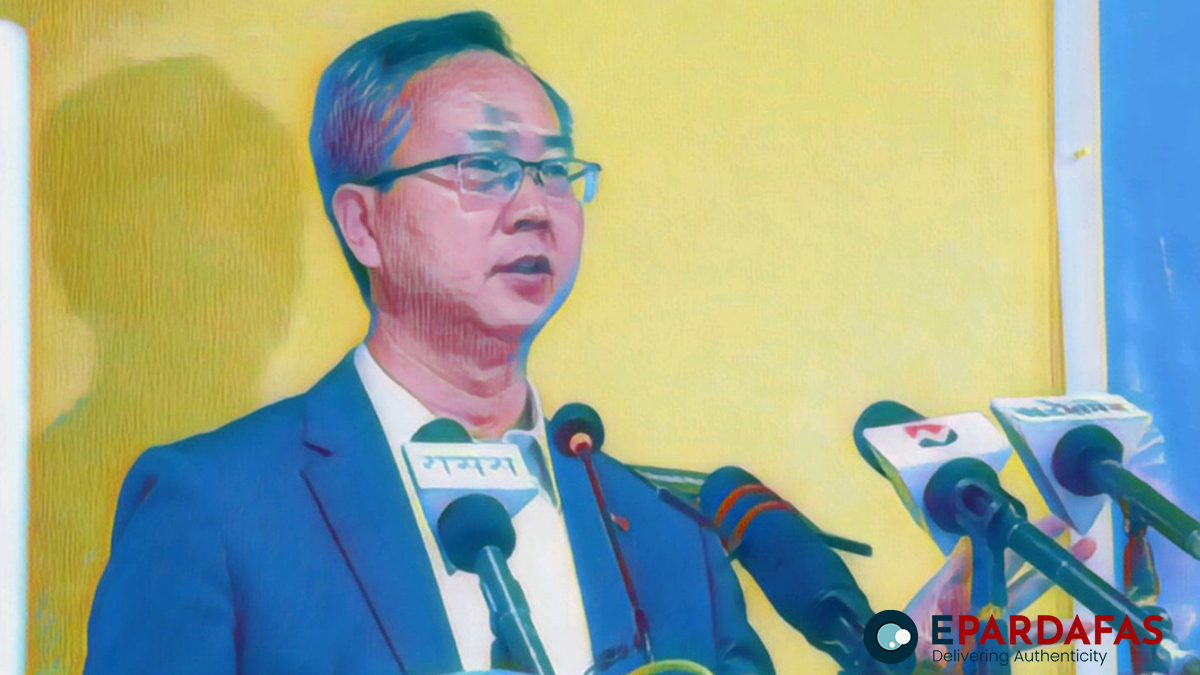
China’s Diplomatic Misstep in Nepal: Unraveling a Diplomatic Faux Pas
The Chinese Ambassador to Nepal, Chen Song, recently caused a diplomatic faux pas, creating an embarrassment for Beijing. While addressing a discussion titled “China in Global Economy and its Impact in Nepal” in Kathmandu, the Chinese Ambassador made some snide remarks on Nepal’s internal affairs as well as on Indo-Nepal relations wherein he criticised India and rebuked Nepal for its dependency on India.1 This incident stood out because Ambassador Chen’s tone and language were not in line with the usual diplomatic decorum. His comments went beyond constructive criticism and came across as provocative. They not only caused a stir in diplomatic circles but also raised questions about China’s approach to Nepal and the broader South Asian region.
Calling Nepal’s policy for India as ‘Policy of Constraints’, claiming that India’s policy towards Nepal and other neighbours is unfriendly, the Ambassador tried to school Nepal on how to conduct its foreign policy as well as how to manage its economy. The Chinese Ambassador’s remarks in Nepal were not only unbecoming but also detrimental to healthy diplomatic relations. He emphasized Nepal’s significant trade deficit with India, which amounted to Rs 9 billion in the power sector and Rs 7 billion in cereals trade, while adopting a sharp and critical tone. Additionally, he did not shy away from harshly criticizing Nepal’s manufacturing sector, claiming it had declined from 14% of GDP to less than 10%. He went on to say that “there is nothing worthy to import from Nepal to China due to lack of a suitable industrial area” and termed it as Nepal’s misfortune to have turned down China’s offer for its construction. These comments served as a stark illustration of the patronizing behavior that has become the hallmark of Chinese diplomats practicing their assertive ‘wolf warrior’ diplomacy but it was far from conducive to fostering positive and constructive relationships.
The Chinese Ambassador’s remarks have been widely criticized in Nepal. It is being considered not only undiplomatic and rash but also an attempt to interfere in Nepal’s internal affairs. A clamour for protesting and sending a diplomatic note to the Ambassador by the Nepal government has risen within the political and strategic community of Nepal. Lecturing Nepal on how to run its economy and trying to portray India as an obstacle to Nepal’s development, Ambassador’s remark shows China’s restive behavior in being unable to normalize its relationship with India as well as its inability to create rift between India and Nepal, and thus poking India in the neighborhood.
Since 2017, China’s intervention in Nepal’s internal affairs has been growing and becoming increasingly direct. In 2019, the two countries elevated their relations to a ‘strategic partnership,’ accompanied by substantial economic packages from China. This move has been interpreted by Nepal’s strategic circles as a form of ‘strategic charity’ from China.3 Under President Xi Jinping, China has shifted its policy orientation towards asserting strategic control over Nepal, viewing it as a gateway to South Asia and a pivotal instrument in its geoeconomic and geostrategic pursuits. India’s increasing economic and military power has been aggravating China’s ‘strategic anxiety.’
China aims at building a Sino-centric regional order in South Asia. India’s growing power and role act as an irritant and ‘strategic hindrance’ to China’s ambitions. Analysts believe that China is actively supporting the creation of a negative perception of India in Nepal’s psychological mind-space.
The recent comments by Ambassador Chen Song are not the first ones that are misleading and unnecessarily intruding in nature. Take for instance a recent Twitter post by the Chinese Ambassador to Nepal Chen Song where he stated the WeChat Cross-border Payment Service inauguration in Nepal as one of the “five connectivities under #BRI initiative.” Such unilateral declarations are coming from China despite Nepal’s Foreign Minister N P Saud stating in Nepal’s House of Representatives that “while the projectimplementation plan of the BRI is still in the consideration phase, not a single project in Nepal under the BRI has been executed so far.”
These developments have to be understood in the context of a larger game whereby China is trying to make inroads into Nepal through its Belt and Road Initiative (BRI), a massive global infrastructure project that aims to connect Asia, Europe, and Africa. China signed a framework agreement with Nepal in 2017 in which 35 projects were to be implemented under the BRI. However, later the number of projects was reduced to only nine and this did not include the Pokhara International Airport, which China now claims. The flagship BRI projects in Nepal are the Trans-Himalayan Multi-Dimensional Connectivity Network (THMCN), which includes a cross-border railway connecting China’s Tibet Autonomous Region with Nepal’s capital, Kathmandu, and the China-Nepal Friendship Industrial Park in Jhapa. These projects, however, are facing numerous challenges including stiff local opposition.
China’s projects in Nepal are likely to make Nepal a victim of its nefarious debt-trap design. Take for example the recently inaugurated Pokhara International Airport itself. This airport has come up with a USD 215 million loan from the Chinese EXIM Bank. The terms for this financing are highly adverse for Nepal’s economy. The rate of interest charged on this loan is 2 per cent, much higher than what other multilateral lenders such as the World Bank and Asian Development Bank (ADB) charge, hovering around 0.25 to 0.75 per cent. In contrast to these multilateral institutions which offer a payback term extending up to 40 years, the Chinese loan can be availed only with a payback deadline of a maximum of 15 to 20 years.
It is important that Nepal remains wary of China’s machinations. China has been playing a long game to establish its hegemony in the region. Inflicted by the ‘Middle Kingdom’ complex, it views the world as an arrangement of concentric circles of power with itself being at the centre. It is increasingly becoming a revisionist power which wants to topple the existing global order, negate the international rules-based order, and assert its Great Power status on other countries.
India-Nepal ties are based on mutual respect and sovereign equality. Unlike China which has been an interloper and pursued its interest with Nepal largely for geostrategic gains, India has followed the policy of non-reciprocity with Nepal and extended favorable terms to Nepal given the civilizational and historical links between the two countries.8 It is China’s wishful thinking that by ranting and raving against India-Nepal relations it will be able to drive a wedge between the two Neighbours.
In conclusion, Chinese Ambassador Chen Song’s recent undiplomatic and condescending remarks in Nepal, criticizing India and belittling Nepal’s economy, exemplify a troubling trend of assertive ‘wolf warrior’ diplomacy. This incident has sparked criticism and calls for diplomatic action within Nepal. It underscores China’s increasing intervention in Nepal’s internal affairs since 2017 and its efforts to gain strategic control over the nation. China’s aim to establish a Sino-centric regional order in South Asia, coupled with its negative portrayal of India in Nepal, is evident. In this context, it is crucial for Nepal to safeguard its sovereignty and carefully consider the implications of its engagements with China, ensuring that they align with the nation’s long-term interests and values.
Read More on Issue:
Chinese Ambassador’s ‘Unbridled Speech’ Sparks Controversy in Nepal
Chinese Ambassador Chen Song’s Remarks on Nepal’s Economic Development and Relations with India Spark Controversy
Chinese Ambassador’s Controversial Remarks Prompt Parliamentary Committee Inquiry














Comments